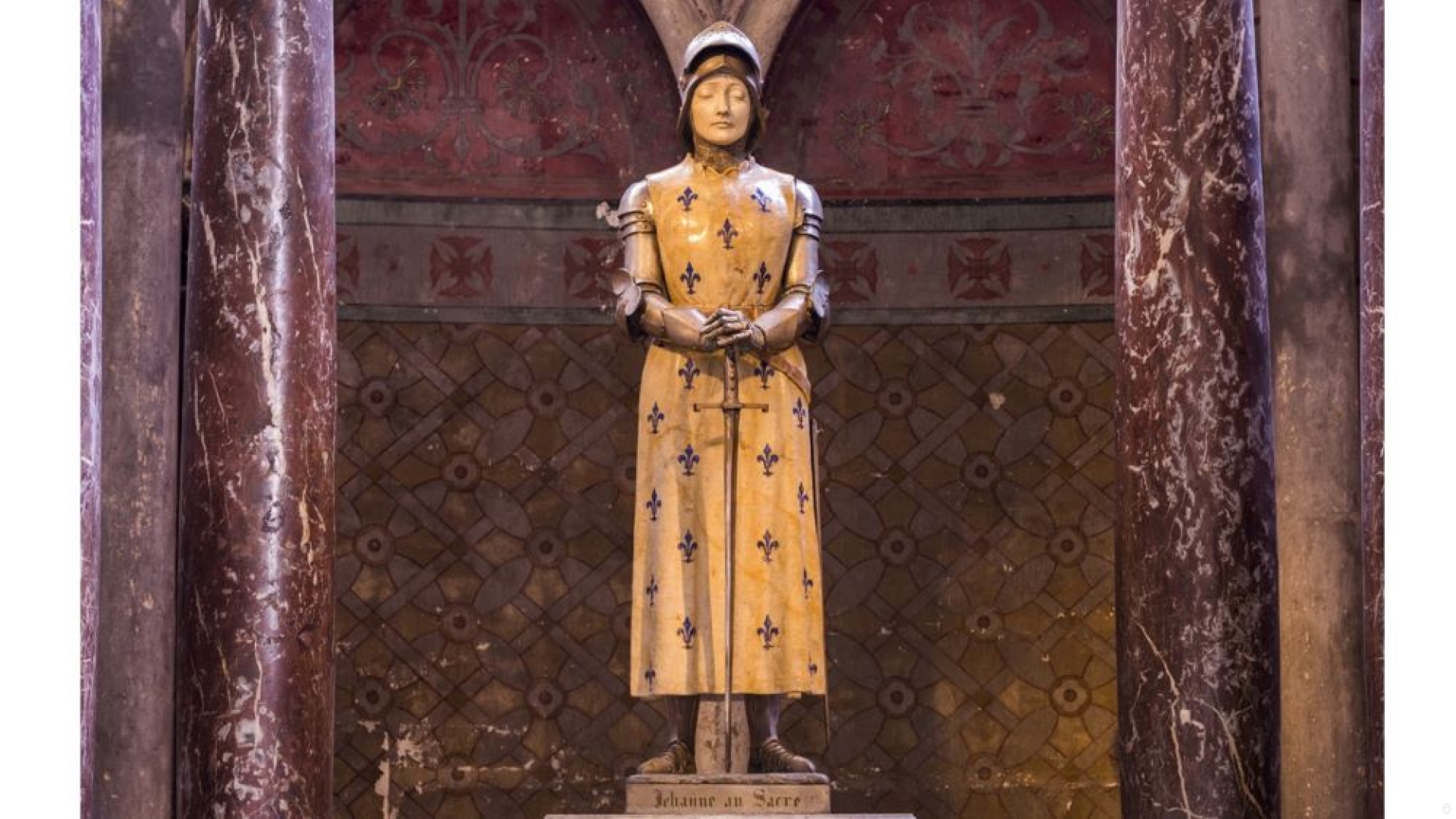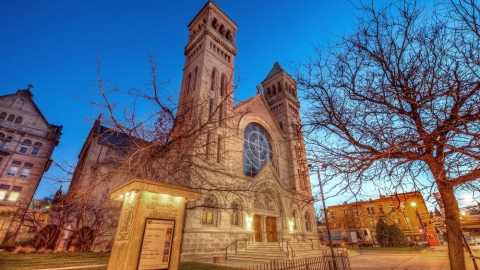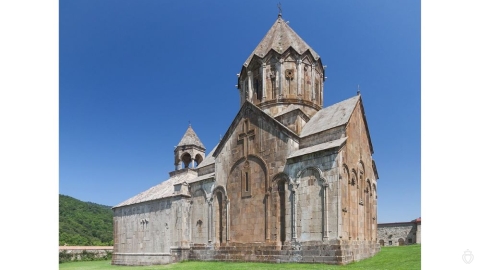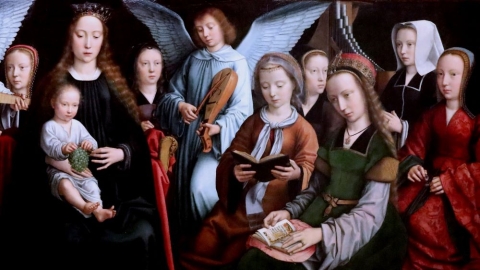The Holiness of the Church (11): Piety and Obedience

Statue of St. Joan of Arc in the chapel of her name at Rheims
Continuing our examination of the virtues linked to justice, we find, coming after religion, piety and obedience. Piety, like religion, seeks to satisfy a real debt, though it cannot do so equally; obedience proceeds from religion or piety, making the mind ready to carry out the precepts of God or superiors, allowing man to easily renounce his own will.
The Virtue of Piety
Piety, understood here as a specific virtue, inclines man to honor his parents and his country, that is, those to whom we owe our life – therefore something that we cannot give back equally. To God, the first principle of our existence, we owe religious worship; to parents, the secondary principle of our birth, we owe piety.
Although in some cases the saints had to go beyond the commands of their parents to submit to God, and they knew how to love God more than their own parents, as the Gospel commands, there was no lack in their lives as noble examples of love and devotion to their parents.
We know the tender affection that St. Thérèse of the Child Jesus showed her parents, even in times of great trial and suffering, such as the early death of her mother and the illness of her father, which led to a long period of infirmity.
Centuries earlier, the young St. Peter Damien, from a very poor family, found a lost coin and immediately thought of using it to celebrate a Mass for the soul of his deceased father.
As for piety towards the homeland, which binds us to the continuity of the generations of the place where we were born, the examples of the saints in this area are not lacking. They have often been the protection and salvation of their cities or their nations, knowing that the only true homeland is the heavenly homeland, because the only Father from whom everything comes is God.
The ancient Fathers of the Church were the refuge of the peoples of the Empire in the midst of the troubles and tribulations which their homeland was experiencing at the time: it was towards them, then towards the holy monks, that the peoples troubled by the end of the Roman order could turn, and it was the Fathers and the monks who took over the vestiges, guaranteeing by their presence the continuity of a civilized life.
St. Catherine of Siena always promoted the good of Italy, which she considered intimately linked to the general good of the Church, with the return of the pope to his seat after decades of residence in Avignon.
The most emblematic example is that of St. Joan of Arc, who associated her deep mystical experience with the struggle for the good of the kingdom of France, according to the indications she received from Heaven itself, author of all rights. In this way, France escaped the crisis initiated by King Henry VIII a century later, which caused England to fall into the Anglican heresy.
Compliance
The virtue of observance deserves special mention. If piety inclines us to worship and honor our carnal lineage, observance inclines us to honor those who have received from God the charge of watching over the common good, spiritual or temporal. They too are the image of the fatherhood of God on earth.
Likewise, St. Thomas Aquinas points out, by this virtue we venerate those who are excellent and superior to us in knowledge or in virtue, even if they do not in fact govern us, as they would be able to do. We understand its connection to the virtue of humility.
It is the saints who have established the liturgical and ceremonial norms which wisely regulate the honor due to each in the sacred rites, thus manifesting precisely the exercise of this virtue. Without going back to the time of the Holy Fathers, consider that one of the main and most active writers of the post-Tridentine Episcopal Ceremonial was St. Charles Borromeo.
The words of St. Francis in his testament on the honor due to priests are an exceptional testimony of humility, saying that he wanted to see in them not sins but the Son of God, and to consider them as his lords, because they are the only ones to administer the Body and Blood of the Lord, the only visible link with Him in this world. He also exhorted them to honor the theologians and doctors of the Church “as those who give us spirit and life.”
As for the veneration of the Roman See and the Pontiff, a book would have to be written just to collect the expressions of absolute devotion of the saints towards the successor of St. Peter, even in the most calamitous periods. It suffices to mention St. Catherine of Siena who, while firmly reminding the pope of his duties, always showed her most complete reverence.
Or St. John Bosco, who was always a zealous supporter of the pope. When the revolutionaries, wanting to use (speciously) the figure of Pius IX for subversive reasons, walked around shouting “Long live Pius IX!”, Don Bosco taught his boys to reply by saying, “Long live the Pope!”
All the saints were observant towards their temporal or religious superiors, as evidenced by the well-known example of St. Francis Xavier who, because of the harshness of his mission in India, only wrote to his superior St. Ignatius only on his knees.
Obedience
An essential weapon for overcoming self-love and self-denial is the virtue of obedience, which makes the mind ready to carry out the will of others, that is, of the one who commands us. It is not surprising that many saints have voluntarily devoted themselves to obedience, which constitutes the deepest part of the vows of religion and the evangelical counsels: indeed, the love of self is much deeper in man than the love of riches and pleasures.
Obedience is truly an essential part of Catholic holiness, and it manifests itself all the more clearly as ecclesiastical society is better ordered. In this, no Christian sect can equal the Roman Church. Indeed, by submitting the supernatural charisms themselves to the examination of obedience, and therefore of humility, only the Roman Church is assured of recognizing the true gifts of God from diabolical illusions and false mysticism.
In obedience to St. Benedict, St. Maurus repeated the miracle of St. Peter and walked on water: indeed, at the order of the abbot to save his fellow student St. Placide who was drowning, the holy monk obeyed with a such eagerness that God granted him such a great miracle.
It should also be noted that the obedience of the saints is never blind, but always looks upward to ultimately obey God alone, of whom men of authority are to be a reflection. Many martyrs have despised the orders of kings to obey God and the Church, and thus demonstrated that the superior will deserves obedience when it fits into the order of things willed by God, and not when is a manifestation of pride and rebellion.
Related links
- The Holiness of the Church (1): Dogma
- The Holiness of the Church (2): The Apologetic Mark
- The Holiness of the Church (3): The Virtue of Faith-1
- The Holiness of the Church (4): The Virtue of Faith-2
- The Holiness of the Church (5): The Virtue of Hope
- The Holiness of the Church (6): The Virtue of Charity-1
- The Holiness of the Church (7): The Virtue of Charity-2
- The Holiness of the Church (8): The Virtue of Prudence
- The Holiness of the Church (9): The Virtue of Justice
- The Holiness of the Church (10): The Virtue of Religion
(Sources : Somme théologique/DTC – FSSPX.Actualités)
Illustration : Photo 102805926 © Kloeg008 | Dreamstime.com





